Tech companies getting into legal scuffles are hardly rare, and a new one has fired up between two internet giants. Mozilla, the open source company behind the Firefox browser and fallen heavyweight Yahoo are suing each other.
The companies are on their way to courts, with Oath joining in Yahoo Holdings in its filed complaint. Recently acquired by Verizon, Yahoo filed a complaint on Dec. 1 in the Superior Court of California. The company says Mozilla breached a contract between the two companies.
Mozilla previously used Yahoo as a default browser on the Firefox browser. However, the company recently said it would be using Google from now on. The change was officially introduced last month when the new Firefox Quantum browser was launched.
The open-source company says it will fight back against Yahoo's filing.
It looks like Mozilla is heading to court for a showdown with Yahoo Holdings and Oath over an alleged breach of contract. The company's new browser has been widely acclaimed and put Firefox firmly back in the mix as a competitor with Google Chrome.
However, to modernize Firefox, Mozilla made the decision to move away from Yahoo. The former internet giant has declined in recent years, has been embroiled in serious security breaches, and was eventually sold to Verizon. Yahoo as a default search engine does not scream fresh and modern.
Of course, Firefox Quantum users can still select to search with Yahoo Search, but Google is the default. However, Yahoo says Mozilla breached a contract signed in 2014, which stated Yahoo Search would be Firefox's default for five years (2019).
Mozilla Fights Back
It is clear why Yahoo wants to push this matter. Five months after signing the deal with Mozilla, the company confirmed search volume was at a five-year high. This was enough to concern Google, which started placing messages on its search results to entice users.
However, the sale of Yahoo to Verizon allowed Mozilla to pull out of the partnership. The company took that option and Yahoo has responded with legal action. Interestingly, the contract between the companies also said an acquiring company would have to pay Mozilla $375 million a year until 2019 if the company was not happy with the acquiring party.
It seems Mozilla is not happy with Verizon and is now counter-suing for the money. Here is the company's response statement:
“On December 1, Yahoo Holdings and Oath filed a legal complaint against Mozilla in Santa Clara County court claiming that we improperly terminated our agreement. On December 5, Mozilla filed a cross-complaint seeking to ensure that our rights under our contract with Yahoo are enforced.
We recently exercised our contractual right to terminate our agreement with Yahoo based on a number of factors including doing what's best for our brand, our effort to provide quality web search, and the broader content experience for our users.
Immediately following Yahoo's acquisition, we undertook a lengthy, multi-month process to seek assurances from Yahoo and its acquirers with respect to those factors. When it became clear that continuing to use Yahoo as our default search provider would have a negative impact on all of the above, we exercised our contractual right to terminate the agreement and entered into an agreement with another provider.
The terms of our contract are clear and our post-termination rights under our contract with Yahoo should continue to be enforced. We enter into all of our relationships with a shared goal to deliver a great user experience and further the web as an open platform. No relationship should end this way – litigation doesn't further any goals for the ecosystem. Still, we are proud of how we conducted our business and product work throughout the relationship, how we handled the termination of the agreement, and we are confident in our legal positions.
We remain focused on the recent launch of Firefox Quantum and our commitment to protecting the internet as a global public resource, especially at a time when user rights like net neutrality and privacy are under attack.”






